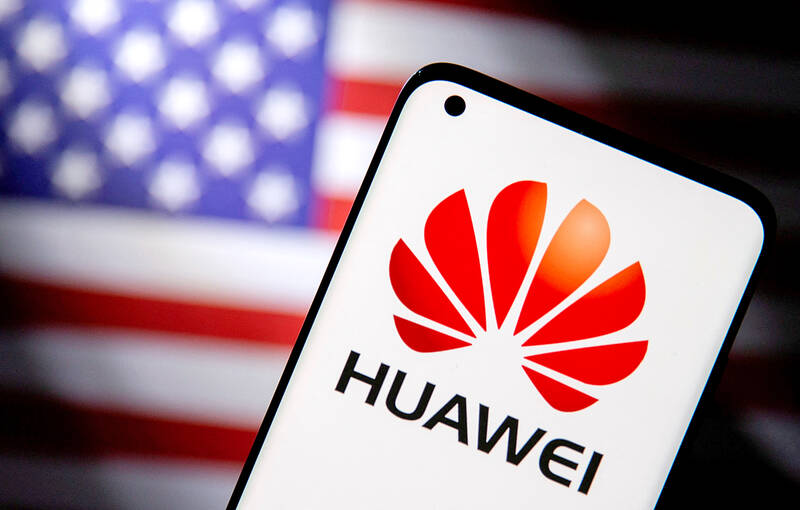Two Taiwanese companies identified in a Bloomberg report as doing business with Huawei Technologies Co (華為)-linked chipmakers in China yesterday said that their dealings in the country did not contravene US sanctions and were in line with national security laws.
Citing the Semiconductor Industry Association, Bloomberg on Tuesday reported that Huawei had set up “its own shadow network of chipmakers” with the support of the Chinese government in a bid to evade US sanctions.
Bloomberg’s report suggested that Huawei has been relying on three little-known firms in Shenzhen — Pengxinwei IC Manufacturing Co (鵬芯微), Pensun Technology Co (鵬新旭) and SwaySure Technology Co (昇維旭) — to produce chips based on its designs, with the involvement of four Taiwanese firms — chip material reseller Topco Scientific Co (崇越), cleanroom equipment supplier L&K Engineering Co (亞翔), construction specialist United Integrated Services Co (漢唐) and chemical supply system provider Cica-Huntek Chemical Technology Taiwan Co (矽科宏晟).

Photo: Reuters
Bloomberg reported that subsidiaries of the four Taiwanese companies had engaged in “unusual” dealings with the three firms, in a manner that “may be helping Huawei develop semiconductors to effectively break an American blockade.”
In a statement yesterday, L&K Engineering said that its Suzhou-based subsidiary was engaged in interior architecture work and electric and line pipe layout, adding that its business in China did not involve technologies and semiconductor equipment sales restricted by Washington.
Cica-Huntek Chemical Technology said that although it has received orders from Pengxinwei and Pensun since June last year to provide chemical supply system solutions for the two Chinese firms’ plants, it has never provided them with IC equipment.
The company said that as it has conducted business legally and followed national policy, it would continue to pursue its contracts with the two Chinese clients.
The statements from Cica-Huntek Chemical Technology and L&K Engineering came a day after Topco Scientific and United Integrated Services denied that their businesses in China had broken any laws by operating in the country.
Minister of Economic Affairs Wang Mei-hua (王美花) on Tuesday told reporters that, to her knowledge, the four Taiwanese companies were not supplying any key technologies or equipment to Huawei, as local companies are legally barred from providing key technologies to China while investing in the Chinese market.

KEEPING UP: The acquisition of a cleanroom in Taiwan would enable Micron to increase production in a market where demand continues to outpace supply, a Micron official said Micron Technology Inc has signed a letter of intent to buy a fabrication site in Taiwan from Powerchip Semiconductor Manufacturing Corp (力積電) for US$1.8 billion to expand its production of memory chips. Micron would take control of the P5 site in Miaoli County’s Tongluo Township (銅鑼) and plans to ramp up DRAM production in phases after the transaction closes in the second quarter, the company said in a statement on Saturday. The acquisition includes an existing 12 inch fab cleanroom of 27,871m2 and would further position Micron to address growing global demand for memory solutions, the company said. Micron expects the transaction to

Nvidia Corp’s GB300 platform is expected to account for 70 to 80 percent of global artificial intelligence (AI) server rack shipments this year, while adoption of its next-generation Vera Rubin 200 platform is to gradually gain momentum after the third quarter of the year, TrendForce Corp (集邦科技) said. Servers based on Nvidia’s GB300 chips entered mass production last quarter and they are expected to become the mainstay models for Taiwanese server manufacturers this year, Trendforce analyst Frank Kung (龔明德) said in an interview. This year is expected to be a breakout year for AI servers based on a variety of chips, as

Global semiconductor stocks advanced yesterday, as comments by Nvidia Corp chief executive officer Jensen Huang (黃仁勳) at Davos, Switzerland, helped reinforce investor enthusiasm for artificial intelligence (AI). Samsung Electronics Co gained as much as 5 percent to an all-time high, helping drive South Korea’s benchmark KOSPI above 5,000 for the first time. That came after the Philadelphia Semiconductor Index rose more than 3 percent to a fresh record on Wednesday, with a boost from Nvidia. The gains came amid broad risk-on trade after US President Donald Trump withdrew his threat of tariffs on some European nations over backing for Greenland. Huang further

HSBC Bank Taiwan Ltd (匯豐台灣商銀) and the Taiwan High Prosecutors Office recently signed a memorandum of understanding (MOU) to enhance cooperation on the suspicious transaction analysis mechanism. This landmark agreement makes HSBC the first foreign bank in Taiwan to establish such a partnership with the High Prosecutors Office, underscoring its commitment to active anti-fraud initiatives, financial inclusion, and the “Treating Customers Fairly” principle. Through this deep public-private collaboration, both parties aim to co-create a secure financial ecosystem via early warning detection and precise fraud prevention technologies. At the signing ceremony, HSBC Taiwan CEO and head of banking Adam Chen (陳志堅)